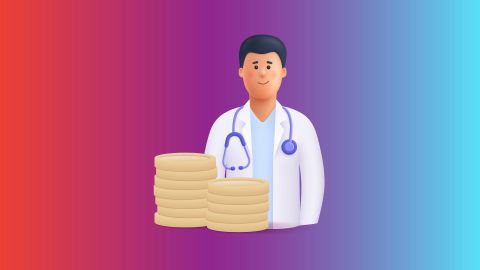Pursuing a postgraduate (PG) course after MBBS is crucial for doctors who want to specialize in areas like Doctor of Medicine (M.D.) or Master of Surgery (M.S.). These specialisations offer better career opportunities, job security, and higher salaries. However, financing PG education can be challenging. This article highlights the top PG medical courses and offers a practical funding solution through Bajaj Finserv’s Doctor Loan, which provides up to Rs. 80 lakh, flexible repayment options, and easy eligibility criteria. Whether you're aiming for specialization or need financial support, this guide helps you make well-informed decisions for a successful medical career. Ready to begin? Apply for doctor loan today and take the next step towards your future in medicine.
List of PG courses after MBBS:
Here is a list of PG courses after MBBS:
- MD (Doctor of Medicine) and MS (Master of Surgery) – 3 years
- DM (Doctorate in Medicine) and MCh (Master of Chirurgiae) – 3 years
- Diploma Courses – 1 to 2 years
- PhD in Medical Sciences – 3 to 5 years
- PG Diploma Courses – 1 to 2 years
Top specialisations in PG Medical Courses
MD (Doctor of Medicine)
The MD degree is a postgraduate programme in medical sciences. It is primarily focused on non-surgical specialisations and is aimed at doctors who want to specialise in specific areas of medicine, such as internal medicine, paediatrics, dermatology, and psychiatry.
- Duration: The MD programme typically lasts for 3 years.
- Specialisations: Some common specialisations under MD include:
- General Medicine
- Paediatrics
- Obstetrics and Gynaecology
- Anaesthesiology
- Dermatology
- Psychiatry
- Career prospects: After completing an MD, doctors can either join hospitals, private clinics, or take up teaching roles in medical colleges. The programme enhances a doctor’s clinical and diagnostic skills, preparing them for leadership roles in healthcare settings.
MS (Master of Surgery)
The MS degree is a postgraduate course that focuses on the surgical aspects of medicine. It is intended for those who want to specialise in performing surgeries and managing surgical cases. It equips doctors with the skills required for advanced surgery, as well as pre-operative and post-operative care.
- Duration: Like MD, the MS programme also lasts for 3 years.
- Specialisations: Some common specialisations under MS include:
- General Surgery
- Orthopaedics
- ENT (Ear, Nose, and Throat)
- Ophthalmology
- Obstetrics and Gynaecology
- Paediatric Surgery
- Career prospects: After completing MS, doctors can specialise further in specific surgical fields, work as surgeons in hospitals, or run their own private practice. MS is a highly respected qualification, and surgeons are in high demand both in the public and private sectors.
Both MD and MS are highly respected degrees and open up numerous career opportunities. While MD is focused on medical diagnosis and treatment, MS provides the skills needed for surgical interventions. However, financing PG education can be challenging. Before beginning your academic journey, you can check your doctor loan eligibility to understand your funding options better.
Importance of pursuing PG courses after MBBS
Pursuing PG courses after completing MBBS is important for several reasons:
Better career prospects
When you go for a masters after MBBS, you open the door to a broad spectrum of career opportunities, as it is entirely up to you which branch of medicine you choose to study.
If you choose to do an MD after MBBS, you can go for fields like: cardiology, oncology, paediatrics, radiology, neurology, general medicine, pathology, gastroenterology, neonatology, and dermatology, among others.
If you choose to do an MS after MBBS, you can opt for paediatric surgery, general surgery, plastic surgery, urology, orthopaedics, ENT, ophthalmology, and others.
Better job security
A super-specialised doctor with high qualifications will always be in demand, by both patients and hospitals. A patient with a specific ailment will always prefer to see a doctor who specialises in the associated branch of medicine. For example, a patient with digestive issues will prefer to see a gastroenterologist, rather than a general physician who only has an MBBS degree.
Better salary
With better qualifications and a more exclusive patient profile, comes better income as well. The earning potential for MD and MS professionals is naturally several lakhs of rupees higher than the average income of a doctor with just an MBBS.
How to fund PG fees after MBBS
Once you have checked out available MS and MD courses after MBBS, you may be wondering – how will you finance your higher studies?
That is easy – Bajaj Finserv brings to you the ideal one-stop financing solution for all your higher education needs. Choose a personal loan for doctors to pay for your specialization after MBBS, and get these benefits:
1. High loan sanction:
With the Bajaj Finserv Doctor Loan, you can get funds up to Rs. 80 lakh, which is more than sufficient to cover every imaginable expense associated with a postgraduation degree, including tuition fees, admission fees, books and other class materials, living expenses, travel expenses, and more.
2. Flexi facility for easy repayment:
Our loan for doctors comes with the unique Flexi facility, which lets you borrow only what you need from your loan sanction, as and when you need it. You pay interest on the sum being actively utilised, and even get the option to pay interest-only EMIs for the early part of the tenure.
3. Long tenure:
Repay your doctor loan easily in manageable instalments over a period of up to 8 years.
4. Easy eligibility:
Any doctor can apply for this loan. All you need is your medical registration certificate, and your KYC documents, along with a minimum CIBIL Score of 650.
Complete your doctor loan application online by filling out a basic form, and get your personalised offer in minutes.
Additional Read: Planning for an MD after MBBS? Here is what you need to know




